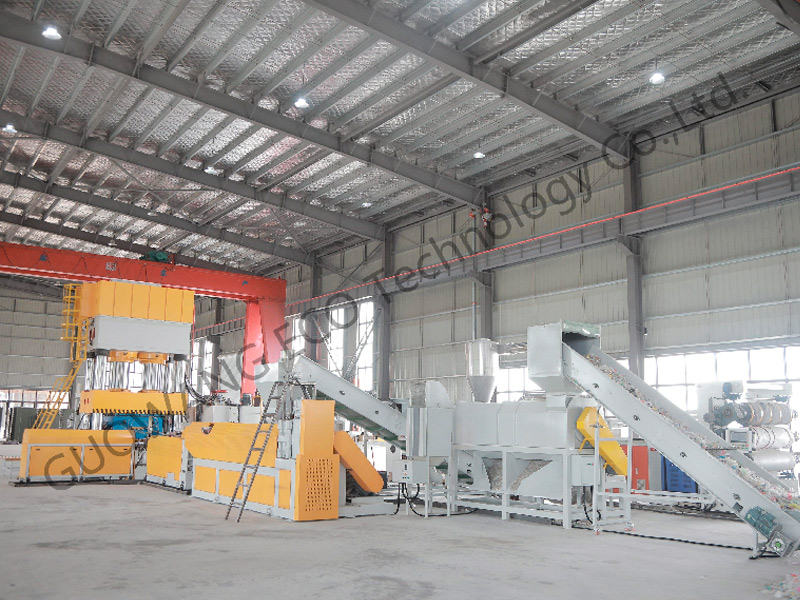Plastic film recycling is the process of collecting and processing used plastic films and transforming them into new, usable materials. Plastic films are thin, flexible sheets of plastic that are commonly used for packaging, such as shopping bags, shrink wrap, and food packaging.
Plastic film recycling helps to conserve resources and reduce waste by taking used plastic films and processing them into new products, rather than sending them to landfills. Many different types of plastic films can be recycled, including polyethylene (PE) and polypropylene (PP) films.
The process of plastic film recycling typically begins with the collection and sorting of used plastic films, which are then processed through various stages by a plastic extrusion molding machine, including crushing, washing, and extruding. During the process of plastic film recycling, impurities are removed, the plastic is melted and reshaped into a continuous strand, and then cut into pellets or used to produce other products.
In conclusion, plastic film recycling is an important part of a more sustainable future, as it helps to conserve resources and reduce waste, while creating new and useful products from used plastic films. By supporting plastic film recycling initiatives, we can help to create a cleaner, greener world.

A plastic film recycling line is a system designed to efficiently process and recycle plastic film waste. These lines can handle various types of plastic film, including polyethylene (PE) film. PE film is the most commonly used plastic film and is found in numerous daily household items. By utilizing a PE film recycling line, this type of plastic film waste can be effectively repurposed rather than ending up in landfills or polluting our oceans.The process of recycling plastic film starts with collection and sorting. Plastic film waste is collected and sent to a recycling facility where it undergoes a thorough sorting process. This ensures that any contaminants, such as paper or other non-plastic materials, are removed. Once sorted, the plastic film is then shredded into smaller pieces. These pieces are then washed to remove any remaining impurities.
Next, the clean plastic film fragments go through a process called extrusion. Extrusion involves melting the plastic and forming it into pellets or granules, which can be used as raw material for various applications. These recycled plastic pellets can be used for making new plastic film products, thereby closing the loop and reducing the demand for virgin plastic production.
As a plastic waste shredder factory with responsibility, GUOWANG ECO Plastic Film Recycling Machine is a high-performance recycling machine that is specifically designed for the recycling of plastic films. This machine features several key functions, including:
Crushing: The first step in the recycling process is to reduce the size of the plastic film, which is done using the crushing function of the machine.
Washing: The crushed plastic film is then washed to remove any impurities, such as dirt and debris, which can impact the quality of the recycled material.
Drying: The washed plastic film is then dried to remove any remaining moisture, which is essential for producing high-quality recycled material.
Extruding: The dried plastic film is then processed through the waste plastic extruder, which melts and reshapes the material into a continuous strand, which can be cut into pellets or used to produce other products.
The clean plastic film is directly crushed or shredded, and then the "one-step extrusion molding plastic film washing machine ", is used to make the products we need.
One of the key advantages of the GUOWANG ECO Plastic Film Recycling Machine is its high efficiency and reliability. This machine is built with high-quality components and materials and is designed to produce consistent and reliable results, making it reliable plastic waste management solutions. Additionally, the machine is user-friendly, making it easy for operators to use and maintain, and it offers flexible processing capabilities, allowing for the recycling of a wide range of plastic film types and thicknesses.
Waste film recycling faces several challenges that limit its growth and success. Some of these challenges include:
Contamination: Used plastic films often contain contaminants such as food waste, dirt, and other debris, which can impact the quality of the recycled material and reduce the efficiency of the recycling process.
Limited Collection: Plastic film recycling requires a dedicated and reliable collection system, which is often lacking in many communities. This results in a limited supply of used plastic films that can be recycled.
Lack of Market Demand: Despite advances in technology developed by plastic recycling equipment manufacturers and increasing awareness of the importance of recycling, there is still a lack of demand for recycled plastic film, which limits the growth of the recycling industry.
Complex Processing: Plastic film recycling requires specialized equipment and advanced processing techniques, which can be costly and time-consuming.
To overcome these challenges, it is important to invest in the development of advanced recycling technologies and to support the growth of the recycling industry through investment and policy measures. Additionally, education and outreach programs can help to increase public awareness of the importance of recycling and to encourage more people to participate in recycling initiatives.